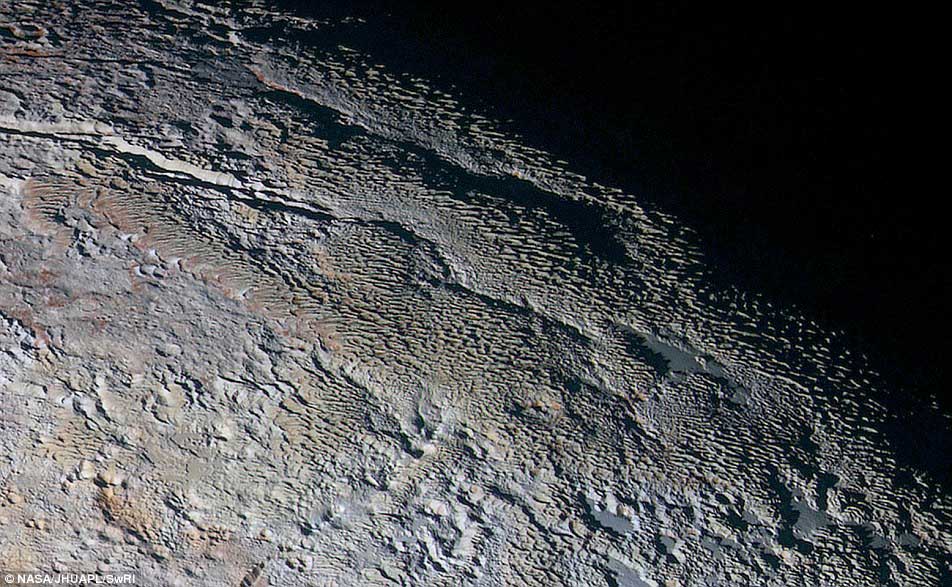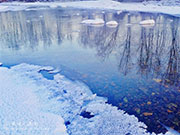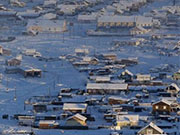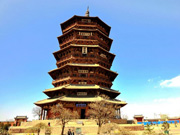

THE SNAKE ON PLUTO: HIGH-RESOLUTION IMAGES REVEAL STRANGE 'ANIMAL SKIN' TERRAIN ON DWARF PLANET

In this extended colour image of Pluto taken by New Horizons, rounded and bizarrely textured mountains, informally named the Tartarus Dorsa, rise up along Pluto's day-night terminator and show intricate but puzzling patterns of blue-gray ridges and reddish material in between. This view, roughly 330 miles (530 kilometers) across, combines blue, red and infrared images
Just like Charon, Pluto's landscape is far more varied than scientists could have ever imagined.
The latest high-resolution images of the dwarf planet, published last week, show this diversity in unprecedented detail, highlighting what appears to be snake-skin-like patterns on its surface.
The clearest image of this was taken near the line that separates day from night, capturing a vast rippling landscape of strange, aligned linear ridges that Nasa said astonished New Horizons team members.
'It's a unique and perplexing landscape stretching over hundreds of miles,' said William McKinnon, New Horizons Geology, Geophysics and Imaging (GGI) team deputy lead from Washington University in St. Louis.
'It looks more like tree bark or dragon scales than geology.
' This'll really take time to figure out; maybe it's some combination of internal tectonic forces and ice sublimation driven by Pluto's faint sunlight.'
Scientists aren't sure what causes the pattern, but theories include the impact of plate tectonics rippling the surface, or frozen gasses that are released when surface temperatures increase.
The 'snakeskin' image of Pluto's surface is just one tantalising piece of data New Horizons sent back in recent days.
The spacecraft also captured the highest-resolution colour view yet of Pluto, as well as detailed spectral maps and other high-resolution images. The new 'extended colour' view of Pluto shows the extraordinarily rich colour palette of Pluto.
 |
Day|Week

 'Coldest town in China' — a fairyland you don't want to miss
'Coldest town in China' — a fairyland you don't want to miss Deep love for breathtaking Hainan
Deep love for breathtaking Hainan Beautiful Chinese tennis player Wang Qiang goes viral online
Beautiful Chinese tennis player Wang Qiang goes viral online Minus 71 degrees! Coldest village on earth
Minus 71 degrees! Coldest village on earth Chinese pole dancing master opens class in Tianjin
Chinese pole dancing master opens class in Tianjin The most beautiful town of snow in China
The most beautiful town of snow in China SWAT members hold romantic wedding in E China
SWAT members hold romantic wedding in E China Breathtaking scenery and simple lifestyle in Hainan
Breathtaking scenery and simple lifestyle in Hainan Finding sexiest underwear supermodels
Finding sexiest underwear supermodels Top 10 ancient pagodas in China
Top 10 ancient pagodas in China